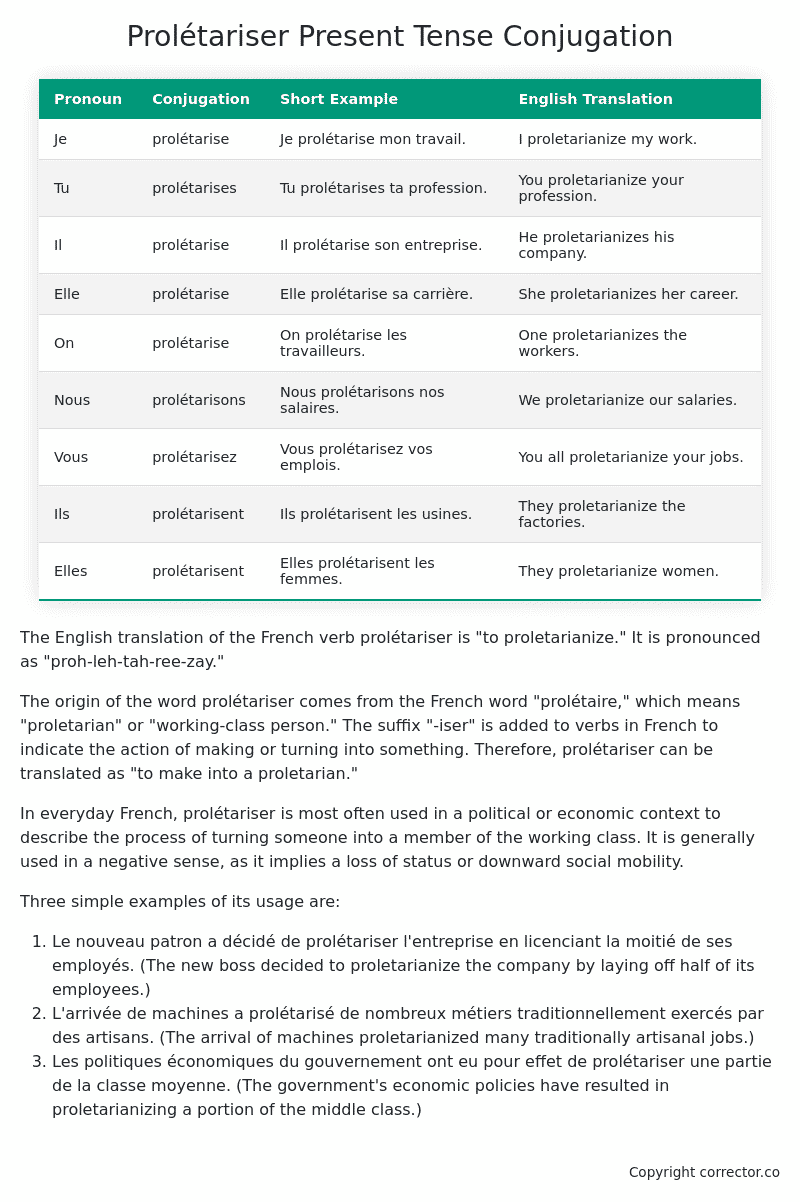Le Present (Present Tense) Conjugation of the French Verb prolétariser
Introduction to the verb prolétariser
The English translation of the French verb prolétariser is “to proletarianize.” It is pronounced as “proh-leh-tah-ree-zay.”
The origin of the word prolétariser comes from the French word “prolétaire,” which means “proletarian” or “working-class person.” The suffix “-iser” is added to verbs in French to indicate the action of making or turning into something. Therefore, prolétariser can be translated as “to make into a proletarian.”
In everyday French, prolétariser is most often used in a political or economic context to describe the process of turning someone into a member of the working class. It is generally used in a negative sense, as it implies a loss of status or downward social mobility.
Three simple examples of its usage are:
- Le nouveau patron a décidé de prolétariser l’entreprise en licenciant la moitié de ses employés. (The new boss decided to proletarianize the company by laying off half of its employees.)
- L’arrivée de machines a prolétarisé de nombreux métiers traditionnellement exercés par des artisans. (The arrival of machines proletarianized many traditionally artisanal jobs.)
- Les politiques économiques du gouvernement ont eu pour effet de prolétariser une partie de la classe moyenne. (The government’s economic policies have resulted in proletarianizing a portion of the middle class.)
Prolétariser – About the French Present Tense
To take a deep dive into all the French tenses then see our article on Mastering French Tense Conjugation.
Common Everyday Usage Patterns For Le Present
Interactions with Other Tenses
Table of the Present Tense Conjugation of prolétariser
| Pronoun | Conjugation | Short Example | English Translation |
|---|---|---|---|
| Je | prolétarise | Je prolétarise mon travail. | I proletarianize my work. |
| Tu | prolétarises | Tu prolétarises ta profession. | You proletarianize your profession. |
| Il | prolétarise | Il prolétarise son entreprise. | He proletarianizes his company. |
| Elle | prolétarise | Elle prolétarise sa carrière. | She proletarianizes her career. |
| On | prolétarise | On prolétarise les travailleurs. | One proletarianizes the workers. |
| Nous | prolétarisons | Nous prolétarisons nos salaires. | We proletarianize our salaries. |
| Vous | prolétarisez | Vous prolétarisez vos emplois. | You all proletarianize your jobs. |
| Ils | prolétarisent | Ils prolétarisent les usines. | They proletarianize the factories. |
| Elles | prolétarisent | Elles prolétarisent les femmes. | They proletarianize women. |
Other Conjugations for Prolétariser.
Le Present (Present Tense) Conjugation of the French Verb prolétariser (this article)
Imparfait (Imperfect) Tense Conjugation of the French Verb prolétariser
Passé Simple (Simple Past) Tense Conjugation of the French Verb prolétariser
Passé Composé (Present Perfect) Tense Conjugation of the French Verb prolétariser
Futur Simple (Simple Future) Tense Conjugation of the French Verb prolétariser
Futur Proche (Near Future) Tense Conjugation of the French Verb prolétariser
Plus-que-parfait (Pluperfect) Tense Conjugation of the French Verb prolétariser
Passé Antérieur (Past Anterior) Tense Conjugation of the French Verb prolétariser
Futur Antérieur (Future Anterior) Tense Conjugation of the French Verb prolétariser
Subjonctif Présent (Subjunctive Present) Tense Conjugation of the French Verb prolétariser
Subjonctif Passé (Subjunctive Past) Tense Conjugation of the French Verb prolétariser
Subjonctif Imparfait (Subjunctive Imperfect) Tense Conjugation of the French Verb prolétariser
Conditionnel Présent (Conditional Present) Tense Conjugation of the French Verb prolétariser
Conditionnel Passé (Conditional Past) Tense Conjugation of the French Verb prolétariser
L’impératif Présent (Imperative Present) Tense Conjugation of the French Verb prolétariser
L’infinitif Présent (Infinitive Present) Tense Conjugation of the French Verb prolétariser
Struggling with French verbs or the language in general? Why not use our free French Grammar Checker – no registration required!
Get a FREE Download Study Sheet of this Conjugation 🔥
Simply right click the image below, click “save image” and get your free reference for the prolétariser Present Tense tense conjugation!

I hope you enjoyed this article on the verb prolétariser. Still in a learning mood? Check out another TOTALLY random French verb present conjugation!


